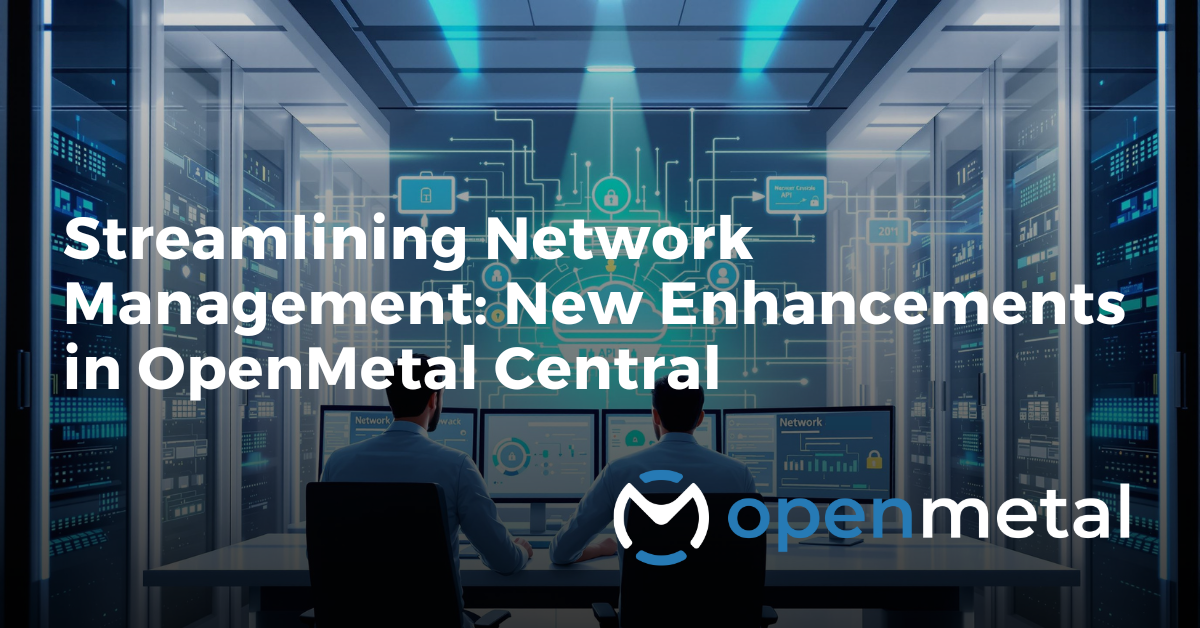At OpenMetal, we’re always working to make managing your private cloud infrastructure easier and more intuitive. In our latest round of updates to OpenMetal Central we’ve introduced advanced networking features that provide greater control, flexibility, and security .
Here’s what’s new:
Organization-Wide Network Navigation
You can now view and manage all of your networking resources across your organization directly in OpenMetal Central. Whether you’re tracking VLANs assigned to bare metal or clouds, or reviewing your public and private IP address blocks we’ve streamlined the way you interact with your networking resources:
- Unified Overview – View all networking components, including VLANs and IP address blocks, in one place.
- Simplified Management – Easily track VLANs assigned to bare metal or clouds for better visibility.
- Faster Decision-Making – Navigate your entire network infrastructure more efficiently from a single interface.
This update is particularly useful for teams managing multi-cloud or hybrid cloud environments, where quick access to networking data helps streamline resource allocation and troubleshooting.
VLAN Listing and Management
Virtual Local Area Networks (VLANs) are essential for segmenting traffic and ensuring security across your environment. With our latest update, you can:
- Create new VLANs and assign them to existing clouds and bare metal resources.
- View and manage all VLANs across your organization’s hardware in one dashboard.
- Easily assign VLANs to individual bare metal servers or private clouds.
- Leverage VPC-like functionality for enhanced network isolation and segmentation.
This central management helps streamline your network configuration process while keeping everything fully visible at the organizational level.
This update is particularly useful for organizations in regulated industries that require strict network segmentation for compliance or security.
IP Address Management
Tracking IP usage and ensuring your IP blocks are efficiently allocated is critical for scalability and operational efficiency. With our enhanced Address Management tools, you can:
- List all IP blocks in use across your organization.
- Track active assignments to avoid conflicts and optimize utilization.
- Create new private IP address ranges as needed.
- Request additional provider IP blocks to expand your network capacity.
- Purchase public IP address blocks directly within OpenMetal Central.
This level of granular visibility helps avoid conflicts, simplifies network planning, and ensures you have the resources you need, when you need them.
This update is particularly useful for cloud service providers, SaaS companies, and enterprises scaling rapidly, ensuring they have the IP resources needed for growth.
Multi-Port VM Interface Configurations
For complex networking setups, flexibility in VM configurations is essential. Now, you can:
- Configure multi-interface VMs with persistent settings for better control.
- Assign multiple IP addresses to a single VM for advanced networking needs.
- Enable load balancing and high availability with multi-port configurations.
This update is particularly useful for companies running high-traffic applications, including AI/ML workloads that require advanced traffic distribution and redundancy.
Simplified IPMI Access via Central Dashboard
Managing hardware remotely is now easier than ever. With the latest update, you can:
- Access IPMI directly through OpenMetal Central without extra steps.
- Monitor and manage servers from a single, unified interface.
- Perform remote maintenance more efficiently with centralized control.
This update is particularly useful for DevOps and IT teams managing remote or distributed infrastructure, allowing them to access critical server management tools without the need for complex workarounds.
Updated Kolla Images with Security Patches
Keeping your services secure and up to date is a top priority. In this release, we’ve:
- Updated Kolla images with the latest security patches and bug fixes.
- Improved cloud service stability with optimized builds.
- Enhanced system integrity to ensure a secure OpenStack environment.
This update is particularly useful for security-conscious organizations and enterprises handling sensitive data, ensuring their OpenStack environment remains up to date and protected from vulnerabilities.
Why This Matters
These enhancements provide a more robust, flexible, and secure networking environment within OpenMetal Central. Whether you’re managing a single private cloud or a complex multi-cloud deployment, these tools empower you to:
- Maintain better organization of networking resources.
- Avoid resource sprawl with clear tracking of VLANs and IPs.
Streamline network management tasks with an intuitive interface.
Ready to see the new features in action?
Log in to OpenMetal Central today to explore and utilize these advanced networking capabilities, and take your network management experience to the next level.
About OpenMetal
OpenMetal provides innovative private cloud infrastructure tailored for businesses looking for greater autonomy, security, and control over their cloud environments. Leveraging OpenStack technology, OpenMetal delivers a flexible, cost-effective alternative to public hyperscalers, enabling organizations to host mission-critical applications and data with unparalleled efficiency and privacy.
Read More on the OpenMetal Blog




































